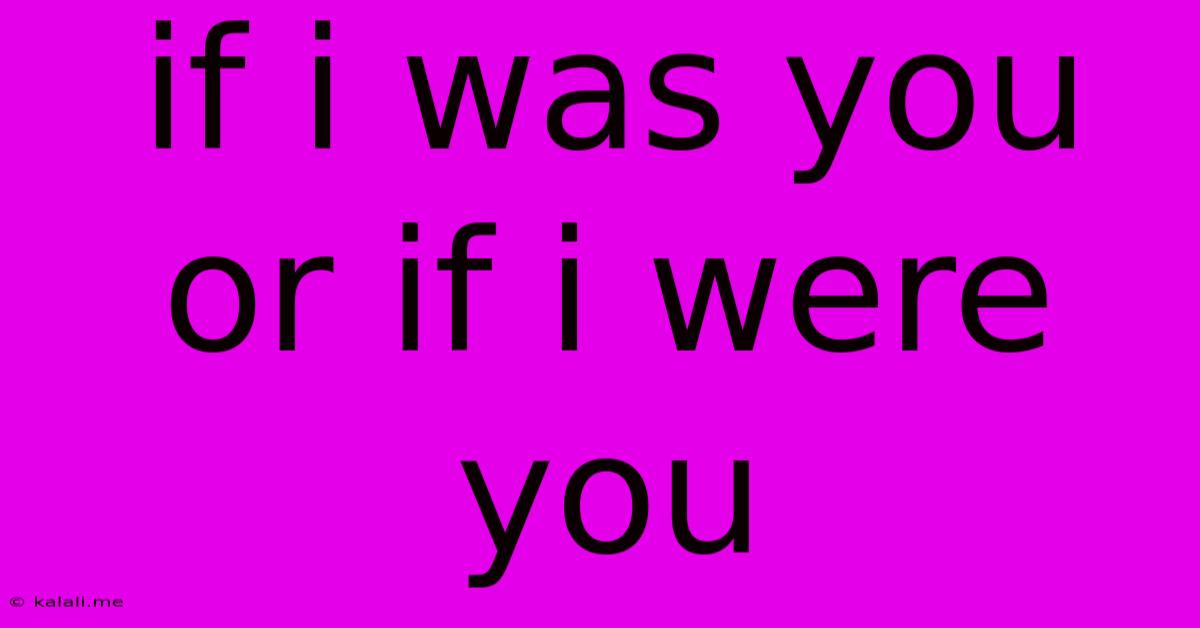If I Was You Or If I Were You
Kalali
May 21, 2025 · 2 min read

Table of Contents
"If I Were You" vs. "If I Was You": Understanding the Grammatical Nuances
Choosing between "If I were you" and "If I was you" often sparks confusion, even among native English speakers. This article clarifies the grammatical difference and helps you confidently select the correct phrase in your writing and conversations. Understanding this subtle distinction will elevate the sophistication of your communication and improve your grammar.
The core difference lies in the verb tense and the type of conditional sentence being used. Both phrases express hypothetical situations, but one is more grammatically correct in formal settings.
Understanding the Subjunctive Mood
"If I were you" utilizes the subjunctive mood. The subjunctive mood expresses wishes, suggestions, or hypothetical situations that are contrary to fact. It often uses "were" with all pronouns, regardless of whether it's singular or plural. This form emphasizes the hypothetical nature of the statement, suggesting the condition is unlikely or impossible. Think of it as a more formal and polite way of giving advice.
Examples:
- "If I were you, I'd apply for the job immediately." (Hypothetical advice)
- "If I were a bird, I would fly south for the winter." (Contrary-to-fact statement)
The Indicative Mood and Past Tense
"If I was you" uses the indicative mood and the past tense. The indicative mood describes factual situations. While grammatically incorrect in many contexts, its use often stems from the similarity of the structure to other past tense conditional sentences. It's generally considered less formal and is more common in informal speech. The use of "was" suggests a past event or a possibility that is closer to reality than the subjunctive.
Examples:
- "If I was you, I would have gone to the party." (More likely to have actually been possible).
- "If I was mistaken, I apologize." (Addressing a potentially factual mistake.)
When to Use Which Phrase?
The choice between "If I were you" and "If I was you" depends largely on context and desired level of formality.
-
Formal writing and speech: Always use "If I were you." This demonstrates a strong grasp of grammar and presents your advice or suggestion with more politeness and precision.
-
Informal conversations: "If I was you" is more common in casual settings and is generally understood. While grammatically less correct, it's often used without raising eyebrows.
-
Emphasis on uncertainty: "If I were you" strongly emphasizes the hypothetical and unlikely nature of the situation. "If I was you" implies a closer possibility.
Beyond the Basics: Expanding Your Understanding
The distinction between these phrases helps illustrate the richness of the English language and the importance of choosing words carefully to convey the precise meaning. Mastering the subjunctive mood opens doors to more nuanced and sophisticated expression in your writing and speaking. Remember to consider your audience and context when making your choice. By understanding the subtle differences, you can ensure your communication is clear, accurate, and impactful.
Latest Posts
Latest Posts
-
How To Get Out Of Boat In Minecraft
May 21, 2025
-
How To Stop Bike Brakes From Squeaking
May 21, 2025
-
What Sports Are Women Better At
May 21, 2025
-
Converting Yearly Interest Rate To Monthly
May 21, 2025
-
How To Know Temperature Of Phone
May 21, 2025
Related Post
Thank you for visiting our website which covers about If I Was You Or If I Were You . We hope the information provided has been useful to you. Feel free to contact us if you have any questions or need further assistance. See you next time and don't miss to bookmark.